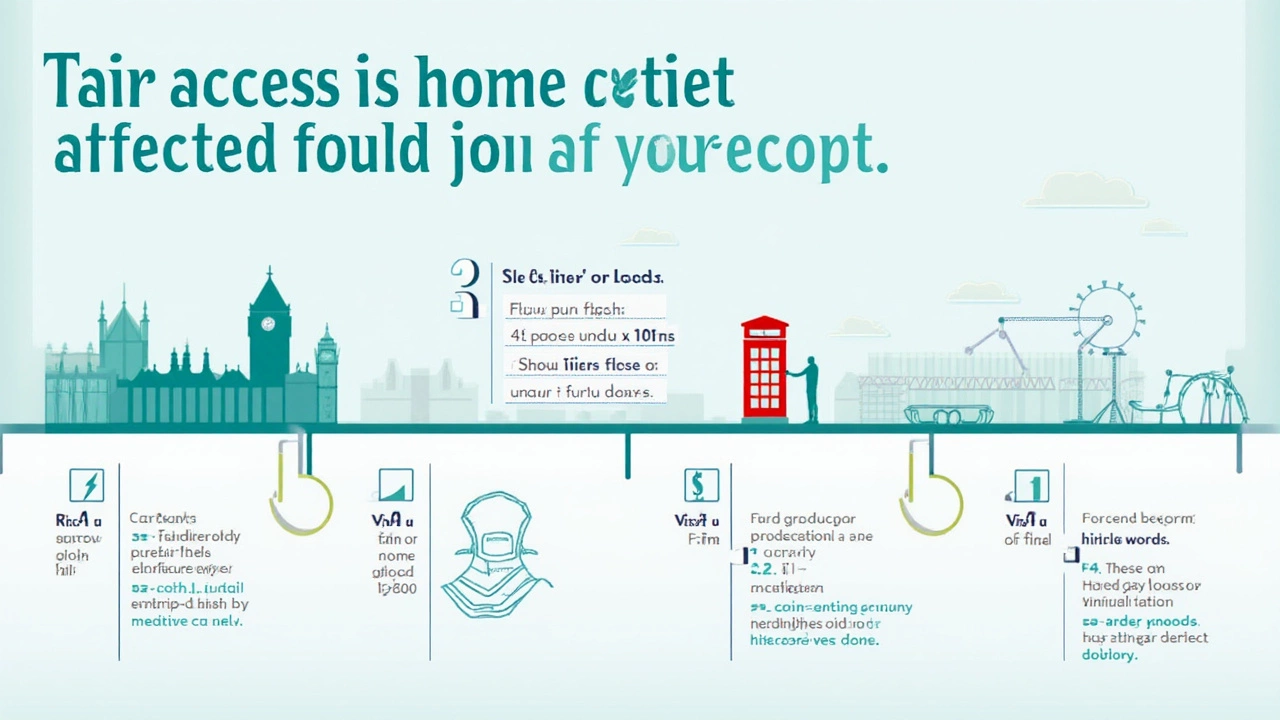Pondering whether to tap into your home's equity is a decision that many homeowners face. It's not just about accessing some extra cash; it's about understanding your financial journey and making it work in your favor. Whether you're looking to fund a renovation, consolidate debt, or simply create a safety net, knowing when to release equity can lead to smart financial decisions.
This guide aims to shed light on the intricacies of equity release. We'll explore the various scenarios where releasing equity might make sense and provide practical advice on how to navigate the process effectively. We'll also touch upon potential pitfalls to avoid, ensuring you're armed with all the knowledge needed to make an informed choice.
- Understanding Home Equity
- Reasons to Consider Equity Release
- When to Pull Equity from Your Home
- Methods of Releasing Equity
- Pros and Cons of Equity Release
- Tips for a Successful Equity Release
Understanding Home Equity
Home equity is a powerful financial tool that represents the portion of your property’s value that you actually own. Think of it as the difference between your home's current market value and the remaining balance on your mortgage. Growing over time as you make mortgage payments and as your property's value appreciates, equity becomes a critical asset in your financial portfolio.
To grasp the full potential of this asset, it’s essential to understand both its tangible and intangible aspects. As you steadily pay off your mortgage, you are effectively increasing your share of ownership in the house, reducing the bank's claim on your property. This reduction is not just chipping away at a loan; it's about building genuine financial equity. In thriving real estate markets, even if your payment barely scratches the principal, an uptick in property value adds to your equity. Thus, homeownership becomes a strategic investment rather than just a living arrangement.
The benefits of healthy equity levels are numerous. Not only does it provide you with a literal safety net during economic hardships, but it also serves as leverage for obtaining better terms on loans. With significant equity, you can access cash through refinancing or equity loans, often with favorable interest rates compared to unsecured borrowing methods. This makes home equity a go-to funding source for big expenses such as college tuition, home improvements, and potentially profitable investments. However, dipping into equity isn’t without its set of risks, and understanding them is crucial.
According to a Harvard University report, "Housing wealth constitutes a significant portion of household wealth, indicating the possible benefits and perils of leveraging this asset." This statement underlines the importance of equitable asset management.
Before deciding on releasing equity, consider the fluctuating nature of real estate markets. Property values can shift unexpectedly, which could affect your overall equity stake. It's also important to recognize that while your home gains value in a robust market, the reverse might happen if the bubble bursts. Therefore, maintaining updated knowledge about local real estate trends is vital. In this manner, you ensure that equity not only rises but remains solid. For a surefire understanding, track real estate data periodically, perhaps bi-annually, to make informed decisions about entering or exiting equity strategies.
Factors Influencing Home Equity Growth
Your equity is shaped by several factors beyond your control and some that you can manipulate. Beyond market forces, punitive interest rates, and neighborhood developments, you also have a say through upgrades to your home. Renovations can dramatically enhance the value of your property, thus boosting equity. Simple, strategic investments like upgraded kitchens, bathrooms, and energy-efficient enhancements often yield significant returns. However, not all renovations equal profit; it's crucial to focus on projects that align with market demand.
| Renovation Project | Average Added Value |
|---|---|
| Kitchens | 15% |
| Bathrooms | 10% |
| Energy-Efficiency Installations | 5-10% |
Understanding these dynamics will give you a clear advantage, helping you identify the best opportunities for using your home equity wisely. Strategic use of home equity can empower you to reach financial goals and secure prosperity over the long term.
Reasons to Consider Equity Release
Choosing to tap into your home's equity is no small decision. It can serve as a financial lifeline or a strategic move to leverage the value of your home for personal gain. Understanding the reasons behind this choice is crucial. Many homeowners discover that releasing equity serves several purposes, such as funding significant home improvements or renovations. Imagine transforming your kitchen or adding that dream sunroom; these upgrades can significantly enhance your home's comfort and market value. By using your home equity for such projects, you're essentially reinvesting into your property's worth, which might increase substantially once the work has been completed.
Another common reason to consider equity release is to consolidate debts. This method can provide a lower interest rate compared to various unsecured loans or credit card debts. By pooling your financial obligations into one manageable monthly payment, you can simplify your finances, potentially save money on interest, and ease the stress associated with juggling multiple due dates. Many people don't realize that equity release can also offer a pathway to bolster retirement income. With pensions lagging in growth, tapping into a home's equity can provide an additional revenue stream, allowing retirees to maintain their lifestyle without compromising their living conditions. By sustaining their quality of life, individuals can enjoy retirement to its fullest.
“Equity release has transformed the way many retirees are financing their later years, allowing them to live more comfortably without the anxiety of financial constraints,” according to a report by the Center for Retirement Research.
Equity release can also play a vital role in helping families support their loved ones. Some homeowners opt to release equity to provide financial assistance to children or grandchildren, whether it be funding higher education or helping with a down payment on a first home. This act can provide substantial benefits, enabling younger generations to achieve their goals without the burden of hefty loans. Additionally, tapping into home equity can be instrumental in creating an emergency fund—a readily accessible pot of money for unforeseen expenses, such as medical bills or urgent home repairs. Having this safety net can make a world of difference when unexpected financial challenges arise.
| Reason | Percentage of Homeowners |
|---|---|
| Home Improvements | 35% |
| Debt Consolidation | 25% |
| Retirement Income | 20% |
| Family Assistance | 15% |
| Emergency Fund | 5% |
Lastly, equity release could potentially empower homeowners to make strategic investments. Using the funds to invest in opportunities such as stocks, mutual funds, or even a new business venture might yield significant returns if managed properly. This approach requires a keen understanding of investment markets as it's a higher risk proposition. Some view it as an innovative way to leverage an existing asset—your home—to forge new financial pathways. The decision to release equity is deeply personal and varied among individuals, hinging on personal goals and circumstances. Thus, it's essential to weigh the benefits against the potential drawbacks when considering this financial strategy.

When to Pull Equity from Your Home
Deciding on the right timing to pull equity from your home can feel like a juggling act, but it's a crucial decision for every homeowner. The timing greatly influences the financial outcome and future implications of such a move. Homeowners might rush into tapping into their home's value without considering all the variables at play. But waiting until the stars perfectly align is not always practical either. Several signs indicate when it might be the right moment to access your home equity.
One of the major factors to consider is the current market condition. When property values are on an upswing, it might be an optimal moment to act. A higher home value means more equity that can be leveraged. But timing based solely on market trends is risky since these trends can be unpredictable. Instead, consider aligning your decision with personal financial needs. If you're planning a major life event that requires significant funds, like a wedding or college tuition, using home equity responsibly could be a wise choice.
Another important indicator is the interest rate environment. When interest rates are low, borrowing against your home's value becomes more affordable, making it a compelling choice. You pay less in interest over time, which keeps your overall debt repayment manageable. Additionally, if you're carrying high-interest debt, refinancing it through a home equity line of credit at today's rates can save money. Keep in mind that rates won't stay low forever, so acting during these periods can be advantageous.
Personal Financial Stability
Your financial stability is an enormously crucial factor when considering an equity release. If you’ve reached a point where you have a steady income and emergency funds, you might feel more comfortable pulling out equity. However, if your job stability is questionable or your finances are turbulent, it might be a good idea to hold off. Financial planners often advise having at least six months' worth of living expenses saved before considering tapping into your home's equity.
"Releasing equity from your home can provide financial flexibility, but it must align with one's long-term financial goals. Timing and personal circumstances should always guide such decisions." — Financial Planning Expert
It’s also wise to consider the purpose of the equity release. Are the funds intended for a productive investment, like home renovation, that might increase your property’s value? Or is it meant for paying off high-interest debts which can lead to better financial health in the future? Clarity in purpose can help guide your decision on whether now is the suitable time.
Leveraging Equity for Investments
For some, using home equity to make strategic investments can be a viable path. Of course, investing with borrowed money inherently carries risk, but for knowledgeable investors, it’s a chance to grow wealth. However, only consider this option if you have a solid understanding of investment markets and a robust strategy. It’s highly recommended to consult a financial advisor to assess the potential returns and risks associated with such an approach.
Ultimately, the decision to pull equity from your home is deeply personal and varies per individual situation. By carefully evaluating the market conditions, your financial health, and the intended purpose of the equity, you can make an informed decision that benefits you now and in the years to come. Take the time to weigh the immediate advantages against the long-term implications, ensuring that when you choose to unlock this financial resource, it aligns with your overarching goals.
Methods of Releasing Equity
Unlocking the value tied up in your home can be a game-changing financial move. Knowing the right method to release this equity is the key to ensuring it aligns perfectly with your financial goals. Broadly speaking, there are several tried-and-true strategies to access your home equity, each catering to different needs and situations. Let's delve into each method to see what works best for you.
Home Equity Loan
The home equity loan, sometimes referred to as a second mortgage, is a popular method. It allows homeowners to borrow a lump sum based on the current equity of their home. Typically, you can borrow up to 85% of your home's equity, resulting in a fixed-rate loan, which means consistent monthly payments. This predictability makes it a favorite for many, particularly for those financing large expenses such as renovations or education. The stability of fixed payments often appeals to those wary of fluctuating interest rates. And with interest rates typically lower than other consumer loans, it's a financially sound option. A crucial aspect to remember, however, is that your home serves as collateral, emphasizing the importance of maintaining those payments.
Home Equity Line of Credit (HELOC)
Offering more flexibility than a fixed loan, the HELOC works more like a credit card. The advantage here is that you only borrow what you need and pay interest just on the borrowed amount. This revolving line of credit can be a perfect fit for those who foresee a series of expenses over time rather than a large single upfront cost. The variable interest rate fluctuates with market conditions, which can be a double-edged sword. For savvy borrowers who can adjust to the ebb and flow of payments, a HELOC presents an advantageous, albeit more involved, borrowing tool.
Bankrate highlights, "With HELOCs, homeowners access funds as needed, making it ideal for ongoing projects like renovations over time."Understanding the nuances of managing a HELOC can lead to significant financial benefits, but be prepared for its variable nature.
Cash-Out Refinance
Then there's the cash-out refinance — an option where you replace your existing mortgage with a new, often bigger loan. This option not only lets you leverage your equity but also potentially secure a more favorable interest rate. Here's how it works: you refinance your principal mortgage for a higher amount than you currently owe. The difference between the old and new loans is paid out in cash. It's a versatile method that serves many purposes, from debt consolidation to funding investment opportunities. While it can lower your interest rate, it can extend your repayment period, which requires careful consideration of your long-term financial health. If you're staying in your home for the long haul and interest rates are appealing, cash-out refinancing can be incredibly strategic.
Reverse Mortgage
A reverse mortgage is specifically tailored for senior homeowners, typically those aged 62 and older. It transforms your home equity into cash, a regular source of income, or a line of credit, all without the burden of monthly repayments. Instead, the loan accumulates with interest, and repayment only occurs once the homeowner sells the home, moves, or passes away. This essentially forms a financial safety net for retirees looking to supplement their income while staying in their home. While a reverse mortgage can alleviate financial strain, it's essential to tread carefully. Understand that fees and interest can accumulate, potentially affecting the inheritance left for heirs. Consider it an option of last resort after evaluating other potential solutions.
As of recent reports, the mortgage sector continues to evolve with innovative solutions tailored to diverse homeowner needs. We see a rising interest in hybrid loans and more personalized advice from financial advisors ensuring homeowners make informed decisions. Regardless of the option you choose, releasing equity shouldn't be taken lightly. It's vital to evaluate each method with a clear understanding of your financial goals and the potential implications on your overall financial well-being.

Pros and Cons of Equity Release
Looking into the potential of tapping into your home equity is like setting out on a path of financial transformation. 🏡 While releasing equity can be a valuable tool for managing your finances, it's important to navigate the benefits and drawbacks before making any decisions. One of the helpful advantages of an equity release is gaining access to significant cash flow without having to sell your home. This newfound liquidity can be used for various purposes such as home improvements, debt consolidation, or even helping out loved ones financially. Additionally, one of the attractive factors of this strategy is the flexibility it offers. There are multiple ways to access your home equity, from traditional home equity loans to innovative reverse mortgages. Each option also comes with different terms, allowing you to customize your investment strategy according to your needs.
On the flip side, relying on equity release involves its own set of challenges. It's crucial to remember that accessing your equity isn't free money. This process typically incurs interest and fees that accumulate over time if not managed properly. Homeowners who opt for a reverse mortgage should note that this type of loan can impact their heirs’ inheritance, as it may reduce the overall value of the estate. There's also the consideration of market fluctuations affecting property values, which could potentially lead to a decrease in your remaining equity. An insightful quote on this topic is shared by financial expert Suze Orman:
"Equity release might seem like a quick fix, but it's essential to take a hard look at the long-term implications for your financial well-being."Evaluating the potential effects on your family's future finances can make this a dicey decision for some.
Understanding the Balance
The balancing act between the pros and cons of equity release requires careful assessment. One critical aspect to consider is how it aligns with your financial goals and lifestyle preferences. The choice to withdraw equity from your home can be seen as part of a larger financial strategy. Some people may find that the advantages outweigh the concerns, especially when undergirded by a robust financial plan. Whether or not it makes sense often depends on factors such as current interest rates, your home's value trajectory, and your intended use of the funds. Despite the benefits, many experts recommend exploring alternative financial solutions first, as they might provide similar results with fewer long-term impacts.
Here's a quick rundown of available figures and facts that might help you decide: according to recent data, nearly 42% of homeowners are looking into releasing their home equity, while about 30% are using it to fund retirements. The home financing landscape is vast, and understanding these statistics can offer a perspective on how common and useful equity release is today. Being armed with this knowledge allows for informed choices that will help set your financial future.
Tips for a Successful Equity Release
When it comes to unlocking home equity, being well-prepared and informed is key to making the process smooth and beneficial. The first step in ensuring success is understanding the full scope of your home equity. Knowing how much you can leverage requires accurately assessing the current value of your home and the outstanding mortgage balance. Getting a professional appraisal might seem like an extra step, but it can provide a clearer picture of your financial standing. Having precise figures helps in setting realistic expectations about what you can draw from your equity stakes without jeopardizing your homeownership.
Next, have clear goals for why you're releasing this equity. Are you planning to invest in renovations that could boost your home's future value, or is it to consolidate debt at a more favorable interest rate? Knowing your end goal not only helps in aligning your finances but keeps you focused on utilizing the funds for their intended purpose. Many financial advisors suggest having a well-thought-out plan as “a guidebook for where the money should take you.” This advice emphasizes long-term thinking over short-term gains, ensuring that you don't find yourself in a financially precarious situation down the line.
Choosing the right method of equity release is also pivotal. Some homeowners prefer a home equity line of credit (HELOC), offering flexibility similar to a credit card, while others opt for a cash-out refinance, which may come with a more structured repayment plan. Understanding the pros and cons of each method will align with your financial capabilities and needs. Researching diligently and comparing offers from various lenders can help unearth the most favorable terms, saving you money and hassle in the future. Remember, the interest rates and conditions you secure now can significantly impact how manageable and advantageous the loan remains over time.
To further safeguard your financial venture, consider consulting with a financial advisor. An expert perspective can help you navigate the intricacies of equity release, ensuring you don’t overlook critical nuances that could affect your financial health. For some, pooling into the wisdom of experienced professionals is akin to having a co-pilot on a complex journey. In fact, John Resnick, a noted financial consultant, once stated,
“Having a trusted advisor can turn daunting financial voyages into navigable waters.”Seeking expert advice could prevent costly missteps and arm you with strategies to maximize the benefits from your equity release.
Additionally, be mindful of future market conditions and potential shifts in property value. While none of us have a crystal ball, keeping an ear to the ground on economic trends could influence your decision on when to act. Some homeowners find it strategic to release equity during favorable market conditions when home values are robust, bolstering the potential amount accessible through their equity.
Lastly, keep an eye on how this new debt impacts your monthly budget. Overextending your finances can lead to stress and put strain on your everyday living expenses. Striking a balance is vital. Make sure you’re comfortable with repayment terms and that they fit snugly within your income stream. If needed, adjust your spending habits to better accommodate the changes. This ensures your household remains financially resilient while you take advantage of the opportunities equity release presents.









